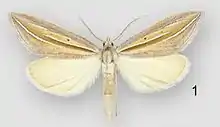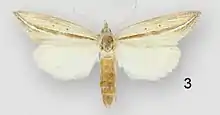Doryodes bistrialis
Doryodes bistrialis, the double-lined doryodes moth, is a moth of the family Erebidae. The species was first described by Carl Geyer in 1832.[1] It is found in the eastern United States, including Delaware, Virginia, Mississippi and Florida. Its habitat consists of wet pine flatwoods and pine savannas.
| Doryodes bistrialis | |
|---|---|
 | |
| Male | |
 | |
| Female | |
| Scientific classification | |
| Domain: | Eukaryota |
| Kingdom: | Animalia |
| Phylum: | Arthropoda |
| Class: | Insecta |
| Order: | Lepidoptera |
| Superfamily: | Noctuoidea |
| Family: | Erebidae |
| Genus: | Doryodes |
| Species: | D. bistrialis |
| Binomial name | |
| Doryodes bistrialis (Geyer, 1832) | |
| Synonyms | |
| |
The length of the forewings is 13–15.5 mm for males and 14.5–16 mm for females. Adults can usually be identified by the narrower dark stripe on the forewing and their relatively small size. Compared to Doryodes spadaria the medial longitudinal stripe on the forewing is much narrower and the hindwings are whitish not buff through June emergences. Adults are on wing from April to October in North Carolina, and throughout the year in Florida.
The larvae feed on Aristida stricta.[2]
Taxonomy
It was considered a synonym of Doryodes grandipennis for some time.
References
- Yu, Dicky Sick Ki. "Doryodes bistrialis (Geyer 1832)". Home of Ichneumonoidea. Taxapad. Archived from the original on March 24, 2016.
- Lafontaine, J. Donald & Sullivan, J. Bolling (October 15, 2015). "A revision of the genus Doryodes Guenée, 1857, with descriptions of six new species (Lepidoptera, Erebidae, Catocalinae, Euclidiini)". ZooKeys (527): 3–30. doi:10.3897/zookeys.527.6087. PMC 4668885. PMID 26692785.
 This article incorporates text available under the CC BY 4.0 license.
This article incorporates text available under the CC BY 4.0 license.
External links
- "930925.00 – 8765 – Doryodes bistrialis – Double-lined Doryodes Moth – (Geyer, 1832)". North American Moth Photographers Group. Mississippi State University. Retrieved February 21, 2019.
- Hollenbeck, Jeff (January 31, 2017). "Species Doryodes bistrialis - Double-lined Doryodes Moth - Hodges#8765". BugGuide. Retrieved February 21, 2019.